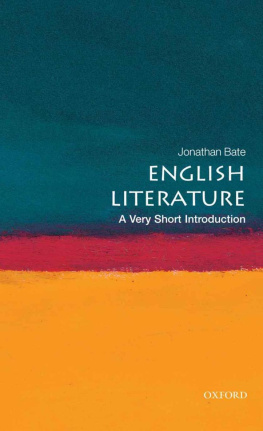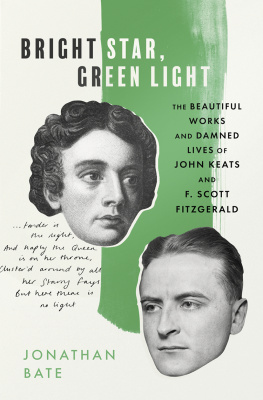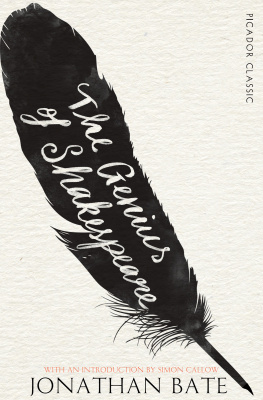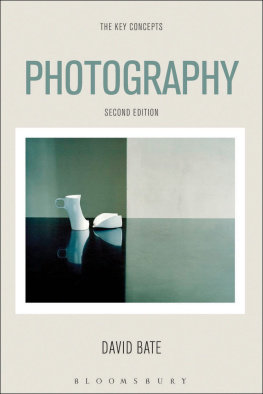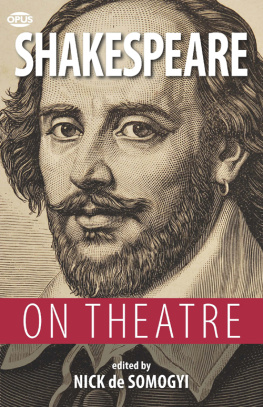Jonathan Bate - Mad about Shakespeare: From Classroom to Theatre to Emergency Room
Here you can read online Jonathan Bate - Mad about Shakespeare: From Classroom to Theatre to Emergency Room full text of the book (entire story) in english for free. Download pdf and epub, get meaning, cover and reviews about this ebook. year: 2022, publisher: HarperCollins Publishers, genre: Detective and thriller. Description of the work, (preface) as well as reviews are available. Best literature library LitArk.com created for fans of good reading and offers a wide selection of genres:
Romance novel
Science fiction
Adventure
Detective
Science
History
Home and family
Prose
Art
Politics
Computer
Non-fiction
Religion
Business
Children
Humor
Choose a favorite category and find really read worthwhile books. Enjoy immersion in the world of imagination, feel the emotions of the characters or learn something new for yourself, make an fascinating discovery.
- Book:Mad about Shakespeare: From Classroom to Theatre to Emergency Room
- Author:
- Publisher:HarperCollins Publishers
- Genre:
- Year:2022
- Rating:5 / 5
- Favourites:Add to favourites
- Your mark:
- 100
- 1
- 2
- 3
- 4
- 5
Mad about Shakespeare: From Classroom to Theatre to Emergency Room: summary, description and annotation
We offer to read an annotation, description, summary or preface (depends on what the author of the book "Mad about Shakespeare: From Classroom to Theatre to Emergency Room" wrote himself). If you haven't found the necessary information about the book — write in the comments, we will try to find it.
Mad about Shakespeare: From Classroom to Theatre to Emergency Room — read online for free the complete book (whole text) full work
Below is the text of the book, divided by pages. System saving the place of the last page read, allows you to conveniently read the book "Mad about Shakespeare: From Classroom to Theatre to Emergency Room" online for free, without having to search again every time where you left off. Put a bookmark, and you can go to the page where you finished reading at any time.
Font size:
Interval:
Bookmark:

From Classroom to Theatre to Emergency Room

William Collins
An imprint of HarperCollinsPublishers
1 London Bridge Street
London SE1 9GF
WilliamCollinsBooks.com
HarperCollinsPublishers
1st Floor, Watermarque Building, Ringsend Road
Dublin 4, Ireland
This eBook first published in Great Britain by William Collins in 2022
Copyright Jonathan Bate 2022
Cover images Igor Ustynskyy/Getty (woman); Shutterstock (ink texture)
Jonathan Bate asserts the moral right to be identified as the author of this work
A catalogue record for this book is available from the British Library
All rights reserved under International and Pan-American Copyright Conventions. By payment of the required fees, you have been granted the non-exclusive, non-transferable right to access and read the text of this e-book on-screen. No part of this text may be reproduced, transmitted, down-loaded, decompiled, reverse engineered, or stored in or introduced into any information storage and retrieval system, in any form or by any means, whether electronic or mechanical, now known or hereinafter invented, without the express written permission of HarperCollins
Source ISBN: 9780008167462
Ebook Edition April 2022 ISBN: 9780008167479
Version: 2022-02-23
For Stanley Wells
and all teachers who are mad about Shakespeare
Are all the people mad?
(Twelfth Night)
I felt rather lonely this morning so I went and unboxd a Shakespeare Theres my Comfort.
(John Keats)
INTERVIEWER : Which are your favorite contemporary writers?
NABOKOV : Shakespeare.
INTERVIEWER : We said contemporary.
NABOKOV : Always Shakespeare.
My offering is a period piece. I hope you may enjoy looking back over my shoulder.
(David Niven, The Moons a Balloon)
M y fathers Shakespeare was the New Temple Edition. Pocket-sized, with bright-red boards, they sat in a row on their own little shelf above the mahogany wireless around which we gathered as a family to listen to the plummy voice of Roy Plomleys weekly presentation of Desert Island Discs on the BBC Home Service. And what book would you take, apart from the Bible and the Complete Works of Shakespeare, which are already there? I wish I had asked my mother and father what book they would have chosen, but the presence of the Bible by their bed and the New Temple Shakespeares in the living room readied the house for the castaways who were regularly invited into our home.
My mother believed that hospitality was a duty; her mother had taken in evacuees during the war. Once a month on a Sunday afternoon we entertained a boy from the local school for the blind, a reminder to me and my brother how privileged we were to have our sight. And every Christmas we welcomed a lonely Australian or Malaysian student via a scheme organized by the Commonwealth Institute in London. That was the only time of year when another wartime rule a frugal table was broken.
We didnt have a television at the time of Winston Churchills funeral, so we watched it at a neighbours home. I laid out an imitation of the procession through the streets of London with my toy soldiers on the dining-room table. Even at the age of six and a half, I sensed that it was the end of the era that had shaped my parents.
Four years later, in 1969, we were propelled into the future, watching the moon landing on our first black and white television. It had taken the place of the big old radio with its visible valves, white knobs and the red line on the dial that moved across the names of stations near and far. The incomplete set of the New Temple Shakespeares remained on the shelf above all through my teens, as if in a shrine. I didnt open them until it was too late.
Much Ado About Nothing has never been my favourite Shakespearean comedy. Over the years, my personal number-one comedy spot has flipped between A Midsummer Nights Dream, The Winters Tale and Twelfth Night. But there is one speech in Much Ado that I can never get out of my head. Claudio has been tricked into believing that his fiance Hero has been unfaithful to him on the eve of their marriage. His gullibility in this regard is a black mark against his character, so he is forced to pay a heavy price. A Friar assists in a cunning plan to make him believe that Hero has died of shock and shame because of the way in which he has denounced her as a whore in the middle of their wedding ceremony. The Friar then delivers a homily that includes the lines
for it so falls out
That what we have we prize not to the worth
Whiles we enjoy it; but, being lacked and lost,
Why, then we rack the value, then we find
The virtue that possession would not show us
Whiles it was ours.
You never really value what you have until you have lost it. Until it is too late. Or who you have, and what their virtues were. This is especially true if you are a teenager, hormonally programmed not to value the virtues espoused by your parents.

It was the summer holidays in early August 1978, the long vacation after my first year at university. I was running a show called Magic Circus. We were a small company of student actors who toured around the village primary schools of Kent, taking the children off their parents hands for an afternoon. Things always went best when the weather was good, allowing the children to run around and the theatre games to fill the playground while artwork could be created inside. The afternoon in the village of Weald was a tough one because it never stopped raining. In the evening, I flopped in front of the television and chatted to my mother and father. For some reason, we found ourselves looking through albums of old black and white photographs of their wedding and my childhood. I told myself that it was time to ask my father to tell me about his life before getting married. Something of which I only had the sketchiest outline: childhood in Frinton-on-Sea, Classical Studies at Cambridge in the late 1920s with the alcoholic novelist Malcolm Lowry as his friend, schoolteaching in Eastbourne and Warwickshire, then the war. But it was late by then, and I was tired. We could pick up the conversation tomorrow or tomorrow or tomorrow.
I wasnt paid for directing the Magic Circus, so I also had a morning job, teaching English language to a class of Greek schoolchildren who had taken up summer residence in Walthamstow Hall, the local girls school. That next day, in the middle of second period, a wasp appeared. I got up to chase it and knocked a book off the table. At that moment Costi Dardoufas, the teacher who organized the summer school, came through the door. I thought he was going to tell me off for horsing around. But he just said, Theres someone to see you. He led me up the passage, in silence. It was Tom Mason, one of the teachers at my school and also our next-door neighbour. He told me it was my fathers heart.
How bad is he? I asked. I knew in my heart that he was dead. Besides, that would be better than a long illness there had been enough of those in the family. Better death than a half-life of confinement. Uncle Tom, as we used to call him when we were children, said briefly what had happened as he drove me home, after Costi had put his arm round my shoulders and told me I neednt work again.
Font size:
Interval:
Bookmark:
Similar books «Mad about Shakespeare: From Classroom to Theatre to Emergency Room»
Look at similar books to Mad about Shakespeare: From Classroom to Theatre to Emergency Room. We have selected literature similar in name and meaning in the hope of providing readers with more options to find new, interesting, not yet read works.
Discussion, reviews of the book Mad about Shakespeare: From Classroom to Theatre to Emergency Room and just readers' own opinions. Leave your comments, write what you think about the work, its meaning or the main characters. Specify what exactly you liked and what you didn't like, and why you think so.



